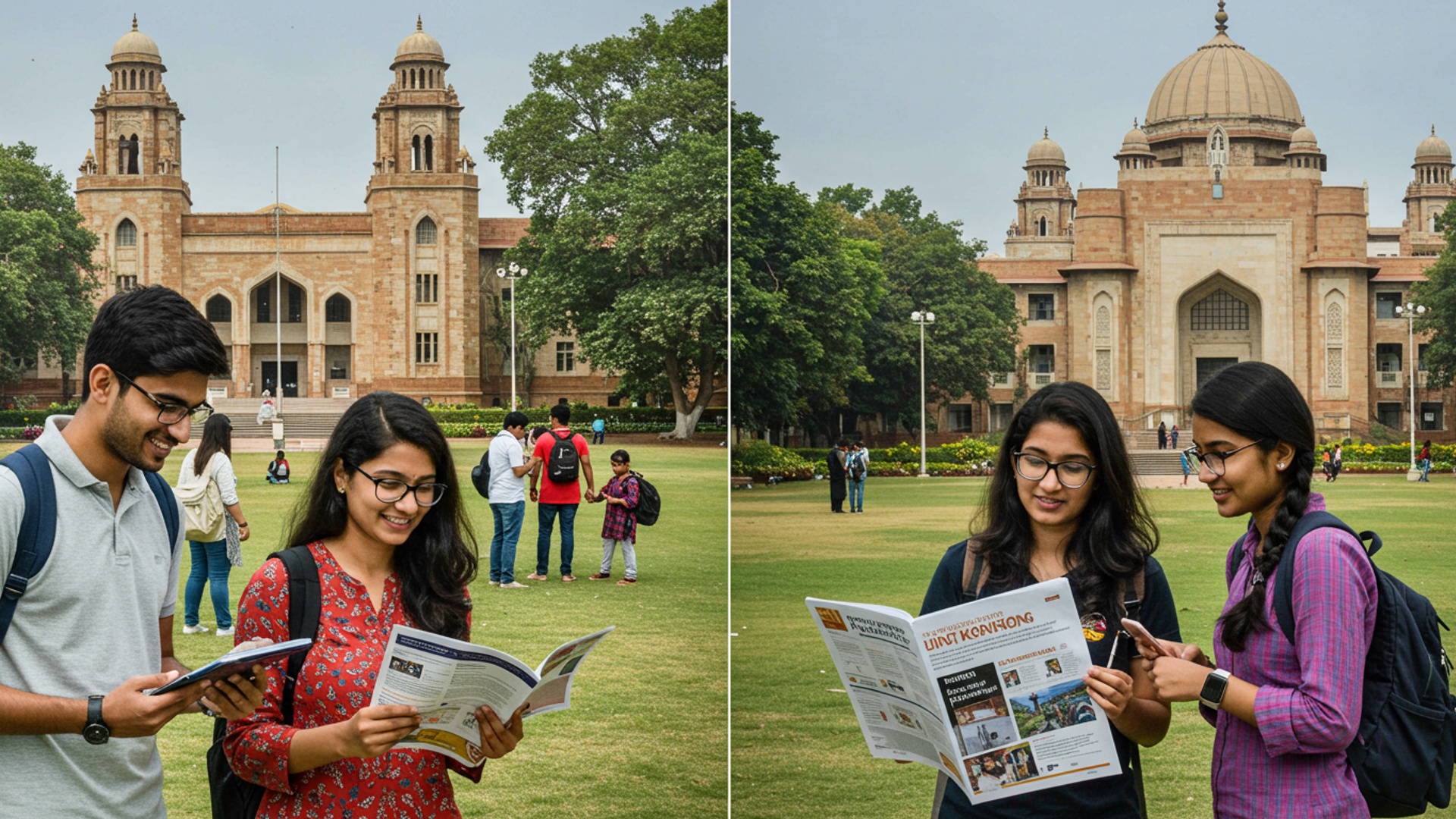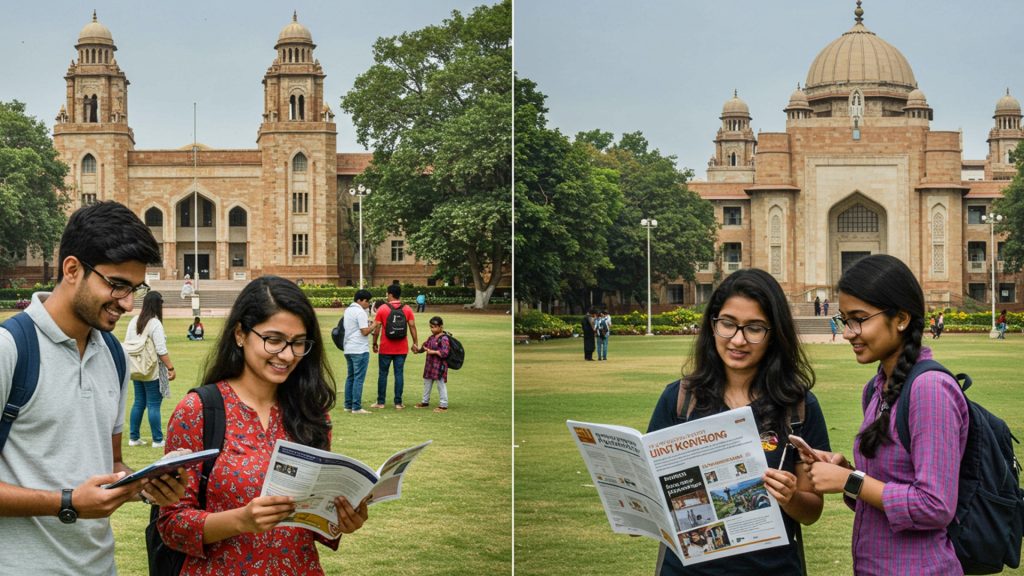Navigating the complex landscape of higher education in India demands more than just identifying a ‘top university in india’; it requires strategic alignment with evolving academic paradigms. With the National Education Policy 2020 emphasizing multidisciplinary learning and skill integration, prospective students must look beyond traditional NIRF rankings. Consider the transformative potential of institutions like the IITs for engineering or AIIMS for medicine. also evaluate their specific program specializations, research opportunities. industry linkages. A truly informed choice prioritizes institutional culture and faculty expertise, ensuring a holistic educational experience that prepares graduates for a dynamic global workforce, rather than solely chasing perceived prestige.

Understanding Your ‘Why’: Self-Assessment is Key
Embarking on the journey to choose your ideal university in India is an incredibly exciting, yet often overwhelming, experience! Before diving into brochures and online rankings, the absolute first step is to look inward. Seriously, take a moment to reflect. What truly drives you? What are your passions, your strengths. your long-term aspirations? This isn’t just about picking a course; it’s about shaping your future self.
Consider these crucial questions:
- What are your academic interests? Do you light up when discussing quantum physics, or are you drawn to the intricacies of human psychology? Perhaps you have a knack for creative writing or a passion for sustainable engineering. Pinpointing subjects you genuinely enjoy will make your learning experience far more rewarding.
- What are your career goals? While it’s okay not to have a definitive career path at this stage, having a general direction can immensely help. Do you envision yourself in research, entrepreneurship, public service, or a creative industry? Some universities are renowned for their strong industry connections in specific sectors.
- What kind of learning environment suits you best? Are you a self-starter who thrives in independent study, or do you prefer collaborative projects and hands-on experiences? Do you prefer large lecture halls or smaller, more intimate seminar settings?
- What are your personal values? Do you prioritize social impact, innovation, artistic expression, or rigorous academic discipline? Finding a university whose ethos aligns with yours can significantly enhance your overall satisfaction.
For example, a student like Priya, who loved biology and wanted to work in wildlife conservation, realized that a generic science degree might not be enough. Her self-assessment led her to seek out universities offering specialized courses in environmental science or zoology, rather than just chasing a degree from any large institution. This deep dive into her own motivations allowed her to narrow down her choices effectively.
Exploring Academic Programs and Specializations
Once you have a clearer picture of your interests, it’s time to explore the vast landscape of academic programs available. India’s higher education system offers an incredible array of courses, from traditional disciplines to cutting-edge interdisciplinary studies. Don’t just look at the degree title; delve into the curriculum, course modules. available specializations.
- Core Curriculum vs. Electives
- Interdisciplinary Programs
- Practical Exposure
- Specializations and Research Areas
grasp how much flexibility you’ll have to choose subjects outside your main discipline. Some programs are highly structured, while others allow for extensive customization through electives, minors. even dual majors.
These are increasingly popular and can offer a unique edge. For instance, a program in “Computational Social Science” or “Design Thinking for Innovation” might combine elements of computer science, sociology. business, preparing you for roles that demand diverse skill sets.
Look for programs that integrate practical learning components such as internships, fieldwork, laboratory sessions, design projects, or clinical rotations. Real-world experience is invaluable for career readiness.
Within a broad program like Engineering or Arts, universities often offer various specializations. For example, a B. Tech in Computer Science might have specializations in Artificial Intelligence, Cybersecurity, or Data Science. Research which faculty members are working in areas that excite you.
Consider the story of Rohan, who was interested in engineering but also had a passion for music. He sought out universities that not only had strong engineering departments but also offered vibrant cultural clubs and even elective courses in music production. This allowed him to pursue both his academic and personal passions, leading to a much richer university experience.
The Importance of Accreditation and Rankings
When selecting a university, it’s absolutely crucial to assess its credibility and standing. This is where accreditation and rankings come into play, providing valuable insights into a university’s quality and reputation. Don’t just blindly follow a list; interpret what these indicators truly mean.
- Accreditation Bodies
- National Institutional Ranking Framework (NIRF)
- International Rankings
In India, the primary accrediting body for higher education institutions is the National Assessment and Accreditation Council (NAAC). NAAC assesses universities and colleges on various parameters like curriculum, teaching-learning processes, research, infrastructure. student support, assigning grades (A++, A+, A, B++, B+, B, C, D). Always check a university’s NAAC grade; a higher grade signifies better quality. Also, professional courses often have specific regulatory bodies, such as the All India Council for Technical Education (AICTE) for engineering and management, the Medical Council of India (MCI) for medicine. the Bar Council of India (BCI) for law. Ensure your chosen program is recognized by the relevant body.
Established by the Ministry of Education, Government of India, NIRF is a methodology used to rank institutions across various categories (Overall, Universities, Engineering, Management, Pharmacy, Medical, Law, Architecture, etc.). NIRF rankings consider parameters like teaching, learning & resources, research & professional practice, graduation outcomes, outreach & inclusivity. perception. It’s a transparent and comprehensive system that can help you identify a top university in India in your specific field. For instance, if you’re looking for a top engineering university, you’d check the NIRF Engineering ranking.
While NIRF focuses on India, global rankings like QS World University Rankings, Times Higher Education (THE) World University Rankings. Shanghai Ranking’s Academic Ranking of World Universities (ARWU) can also provide a broader perspective, especially if you have international aspirations. But, remember that these global rankings might use different methodologies that sometimes favor research output over undergraduate teaching quality, so interpret them with context.
| Ranking System | Primary Focus | Key Parameters | Indian Context Relevance |
|---|---|---|---|
| NAAC Accreditation | Quality assurance & improvement | Curriculum, teaching-learning, research, infrastructure, student support | Essential for basic quality check, mandatory for grant eligibility. A high grade is a strong indicator of institutional quality. |
| NIRF Rankings | Performance comparison & national recognition | Teaching, learning & resources; research & professional practice; graduation outcomes; outreach & inclusivity; perception | Most relevant for identifying a top university in India across various disciplines. Comprehensive and government-backed. |
| Global Rankings (QS, THE) | International reputation & research prowess | Academic reputation, employer reputation, faculty/student ratio, citations per faculty, international faculty/students | Useful for understanding global standing and research intensity. may not fully capture the nuances of undergraduate experience in India. |
Always use a combination of these resources. Don’t just pick a university because it’s high on one list; interpret why it’s ranked that way and if those strengths align with your priorities.
Faculty Expertise and Research Opportunities
The heart of any great academic institution lies in its faculty. These are the individuals who will guide your learning, inspire your intellectual curiosity. potentially become your mentors. When evaluating a university, look beyond just the shiny buildings and consider the people who make the institution thrive.
- Faculty Qualifications and Experience
- Research Output and Publications
- Research Labs and Centers
- Student Research Opportunities
- Industry Connections
Research the academic background of the professors in your chosen department. Do they have PhDs from reputable institutions? What is their teaching experience? A faculty with a diverse range of expertise enriches the learning environment significantly.
A strong research culture is a hallmark of a dynamic university. Look at the faculty’s publications in peer-reviewed journals, their involvement in national and international conferences. any patents or innovations they’ve contributed to. This indicates an active and forward-thinking academic environment.
Does the university have state-of-the-art research facilities, specialized labs, or dedicated research centers relevant to your interests? For students aspiring to pursue higher studies or careers in research, access to such resources is invaluable.
Many universities offer opportunities for undergraduate students to participate in research projects, either as part of their curriculum or as extra-curricular activities. These experiences can be transformative, providing hands-on learning, critical thinking skills. a deeper understanding of your field.
Faculty members often have strong ties with industry, which can translate into valuable internships, guest lectures. placement opportunities for students.
For instance, at a top university in India known for its engineering programs, you might find professors who are also consultants for major tech companies, bringing real-world challenges and insights directly into the classroom. Or, in a humanities department, you could have professors leading cutting-edge digital humanities projects that offer students unique research avenues.
Campus Life and Student Support Systems
University isn’t just about academics; it’s a holistic experience that shapes your personal growth, social skills. overall well-being. A vibrant campus life and robust student support systems are vital for a fulfilling and successful university journey.
- Student Clubs and Organizations
- Hostel Facilities and Accommodation
- Sports and Recreation
- Mental Health and Counseling Services
- Career Services and Placement Cell
- Alumni Network
Explore the variety of student-run clubs, societies. organizations. These can range from academic clubs related to your major, to cultural groups, sports teams, debate societies, entrepreneurial cells. social impact initiatives. Active participation fosters leadership skills, teamwork. a sense of community.
If you plan to live on campus, investigate the quality of hostel accommodation, including room types, amenities, mess facilities. safety measures. A comfortable living environment is crucial for academic focus.
Does the university offer excellent sports facilities (gyms, courts, fields) and opportunities for both competitive and recreational sports? Physical activity is essential for maintaining health and managing stress.
The transition to university can be challenging. A strong support system, including professional counseling services, mental health awareness programs. peer support networks, is incredibly essential for student well-being.
A dedicated career services department can be a game-changer. Look for universities that offer career counseling, resume building workshops, interview preparation, internship assistance. a strong track record of placements. They often facilitate connections with potential employers.
A strong and engaged alumni network can provide invaluable mentorship, networking opportunities. career guidance long after you graduate.
Consider the example of Sanjana, who initially prioritized only academic rankings. But, after visiting a few campuses, she realized the importance of extracurriculars. She chose a university with a thriving theatre scene, which allowed her to balance her rigorous engineering studies with her passion for acting, leading to a much more balanced and joyful student life.
Location, Infrastructure. Facilities
The physical environment and location of your university play a significant role in your daily life, opportunities. overall experience. Think about where you want to spend the next few crucial years of your life.
- Urban vs. Rural/Suburban Campus
- Urban Campuses
- Rural/Suburban Campuses
- Campus Infrastructure
- Libraries and Learning Resources
- Laboratories and Workshops
- Technology and Connectivity
- Accessibility
- Safety and Security
Each has its pros and cons.
Often offer access to more internships, part-time jobs, cultural events, entertainment. networking opportunities with industries. But, they might come with higher living costs and a faster-paced lifestyle.
Typically provide a more serene and focused academic environment, often with larger, greener campuses. Living costs might be lower. access to external amenities and industry might be limited.
Evaluate the quality and modernity of the university’s buildings, classrooms, auditoriums. administrative blocks. Good infrastructure contributes to a conducive learning environment.
A well-stocked library, both physical and digital, with access to a wide range of books, journals, databases. e-resources, is fundamental for academic success. Check for quiet study spaces and accessible technology.
For science, engineering. vocational courses, state-of-the-art laboratories with modern equipment are non-negotiable. For arts and design, look for well-equipped studios and workshops.
Ensure the campus offers reliable Wi-Fi, computer labs. access to necessary software and technological tools that support your studies.
If you have specific accessibility needs, research how well the campus accommodates them, including ramps, elevators. accessible restrooms.
A safe campus environment is paramount. Inquire about campus security measures, emergency services. student safety protocols.
When selecting a top university in India, remember that infrastructure isn’t just about aesthetics; it’s about functionality and how well it supports your academic and personal growth. A university in a metro city like Bangalore might offer unparalleled tech industry exposure, while one nestled in a smaller town might provide a more focused, community-driven academic experience.
Understanding Admission Processes and Eligibility Criteria
Navigating the admissions labyrinth can feel daunting. being well-informed is your superpower. Each university and program will have specific requirements, so meticulous research is essential.
- Eligibility Criteria
- Entrance Examinations
- National Level
- State Level
- University Specific
- Application Deadlines and Timelines
- Application Process
- Interviews and Group Discussions
- Reservation Policies
This is your first hurdle. Carefully check the minimum academic qualifications required for your desired course (e. g. , minimum percentage in 10+2, specific subjects required). Some programs may also have age limits.
Many undergraduate programs in India require specific entrance exams.
Examples include JEE Main/Advanced for engineering, NEET for medical courses, CLAT for law, NID/NIFT for design, CUET for admission to central universities. various others for management, hotel management, etc.
Many states conduct their own common entrance tests for engineering, medical. other courses within their state universities.
Some private universities or deemed universities conduct their own entrance exams.
Mark these crucial dates on your calendar! Missing a deadline can mean missing out on your dream university. Create a timeline for each application, including exam dates, result announcements. counseling/interview schedules.
comprehend whether the application is online or offline, what documents are required (mark sheets, certificates, photographs, ID proofs). if there’s an application fee.
For some programs, especially in management, design, or liberal arts, interviews and group discussions are part of the selection process. Prepare to articulate your motivations, strengths. goals.
India has specific reservation policies for various categories (SC, ST, OBC, EWS, PwD, etc.). interpret how these apply to your situation, as they can significantly impact cut-offs and admission chances.
A helpful strategy is to create a spreadsheet listing all your target universities, their eligibility criteria, required entrance exams. crucial dates. This systematic approach, as successfully employed by countless students like Dhruv who applied to multiple engineering exams, can help you stay organized and on track. Remember, securing a spot in a top university in India often starts with excelling in these competitive entrance exams.
The Financial Factor: Fees, Scholarships. ROI
Education is an investment. understanding the financial implications is a critical part of choosing the right university. Don’t let cost be a deterrent. definitely let it be a well-researched factor.
- Tuition Fees
- Cost of Living
- Scholarships and Financial Aid
- Educational Loans
- Return on Investment (ROI)
These vary dramatically across institutions and programs. Government-funded institutions generally have lower fees than private universities. Research the total cost of the program, not just the annual tuition, as fees can sometimes increase year-on-year.
Beyond tuition, consider living expenses, including accommodation (hostel or rented), food, transportation, books, personal expenses. miscellaneous costs. This can vary significantly based on the university’s location.
Many universities and external organizations offer scholarships based on merit, financial need, specific talents (sports, arts), or categories (e. g. , scholarships for girl students, minority groups). Actively search and apply for these! Don’t assume you won’t qualify.
Banks and financial institutions offer education loans to support higher studies. Research interest rates, repayment terms. eligibility criteria.
While not purely financial, consider the potential career outcomes and earning potential associated with a degree from a particular university and program. A higher fee might be justifiable if the university has an excellent placement record and strong industry connections.
For example, while a private top university in India might have higher fees, it could also offer state-of-the-art facilities, specialized industry-relevant courses. a strong placement cell that helps secure high-paying jobs, thus offering a good ROI. Conversely, a government institution with lower fees might provide an equally strong academic foundation at a fraction of the cost. It’s about finding the balance that works for your family’s financial situation and your career aspirations.
Beyond the Brochure: Connecting with Current Students and Alumni
Brochures and websites paint an ideal picture. the real insights come from those who’ve lived the experience. Engaging with current students and alumni can provide invaluable, authentic perspectives that no official document can match.
- Student Testimonials and Forums
- University Visits and Open Houses
- Connect on Social Media/LinkedIn
- Mentorship Programs
Look for online student forums, university-specific social media groups. official student blogs. These platforms often host candid discussions about campus life, faculty, academic rigor. challenges.
If possible, visit the campus! This is perhaps the best way to get a feel for the environment, meet faculty, interact with students. assess the facilities firsthand. Attend open houses or data sessions.
Reach out to current students or recent alumni on platforms like LinkedIn. Politely ask if they’d be willing to share their experiences or answer a few questions about their university journey.
Some universities or external organizations facilitate mentorship programs that connect aspiring students with current undergraduates or alumni.
Imagine speaking to a final-year student at a top university in India and asking them about the workload, the support system, or even the best spots for a quick coffee. Their unfiltered responses can reveal nuances that are crucial for your decision-making. For instance, a student might tell you about the incredible support they received from a career counselor, or about a particular club that transformed their social life, details you wouldn’t find in any official publication.
Making the Final Decision: A Strategic Approach
You’ve done your research, reflected on your aspirations. gathered a wealth of insights. Now comes the exciting, yet challenging, part: making that final choice. Approach this with a strategic mindset, combining logic with your gut feeling.
- Create a Pros and Cons List
- Prioritize Your Factors
- Consult Trusted Advisors
- Trust Your Gut
- Have a Backup Plan
For your top 2-3 university choices, make a detailed list of pros and cons across all the factors we’ve discussed: academics, faculty, campus life, location, cost. career prospects.
What matters most to you? Is it academic reputation, specific research opportunities, a vibrant campus culture, or affordability? Rank your priorities and see which university aligns best.
Talk to your parents, school counselors, teachers. mentors. Share your research and your thought process. They can offer valuable perspectives and help you think through aspects you might have overlooked.
After all the logical analysis, there’s an undeniable emotional component. Which campus felt right when you visited? Which university’s vision genuinely excites you? Sometimes, your intuition is a powerful guide.
It’s wise to have a second or even third choice that you’d be happy with, just in case your primary choice doesn’t work out.
Ultimately, choosing the right university is a deeply personal decision. There’s no single “best” university for everyone; there’s only the best university for you. By diligently following these steps and trusting your judgment, you’ll be well-equipped to make an informed decision that sets you on an incredible path toward a bright and fulfilling future. Embrace this exciting new chapter!
Conclusion
Choosing the right university in India is less about chasing an elusive “best” ranking and more about discovering your authentic path. I recall the immense pressure to conform. my personal tip is to begin with introspective reflection: what truly excites you, beyond parental or peer expectations? Don’t just blindly follow the herd to a traditional institution; instead, consider the burgeoning interdisciplinary programs and skill-focused curricula now prevalent, often reflecting the progressive vision of the National Education Policy. For instance, if you’re drawn to data, explore specialized business analytics degrees at newer private universities alongside traditional engineering. Your actionable next steps involve rigorous research beyond glossy brochures. Connect with current students via online forums, speak to alumni. ideally, visit campuses to gauge the culture firsthand – it’s crucial for understanding the student experience, much like assessing a startup’s team before investing. Remember, the landscape is evolving, with many regional universities now offering excellent, specialized programs. This decision is a profound investment in yourself, shaping not just your career but your entire worldview. Embrace the journey with confidence; the right fit will empower you to thrive.
More Articles
Unlock Your Potential: How Open University Degrees Elevate Your Career Prospects
Charting Your Path: Exploring Exciting Career Opportunities in Business Analytics for 2025
Discovering Bihar’s Best Universities: Your Guide to Top-Tier Education and Future Success
AILET 2025 Success: Essential Section-Wise Strategies and Time Management Secrets for Aspirants
Unlock Your Law Career: Proven CLAT 2025 Tactics for Admission to Premier Institutions
FAQs
I’m just starting my university search in India. Where should I even begin?
Start with some self-reflection! Think about your interests, career aspirations, preferred learning style. even the kind of campus environment you’d thrive in. Once you have a clearer idea of what you’re looking for, you can begin researching programs and institutions that align with those personal preferences, rather than just jumping straight to rankings.
How do I make sure the courses offered actually fit what I want to study?
Dive deep into the curriculum for your chosen program. Don’t just look at the title; examine the specific subjects, elective options. even the teaching methodologies. Some universities might offer unique specializations, interdisciplinary approaches, or practical exposure that could be a perfect match for your niche interests.
Does the university’s location really matter that much?
Absolutely, location plays a huge role! Consider the city’s culture, cost of living, proximity to home (if that’s crucial to you). access to internships or industry opportunities relevant to your field. Also, think about the campus environment – do you prefer a bustling city campus or a more serene, green one away from the urban rush?
University fees in India vary a lot. How can I manage the costs?
Financial planning is key. Look into the total cost, which includes tuition, hostel fees. estimated living expenses. Many universities offer scholarships based on merit or need. some also have tie-ups with banks for education loans. Don’t hesitate to explore all available financial aid options.
What should I look for to ensure I get good job prospects after graduation?
Investigate their placement records, industry connections. the strength of their alumni network. Check what companies typically recruit from there and the kinds of roles offered. A strong career services department, ample internship opportunities. programs that focus on practical skill development are all great indicators.
Are university rankings the only thing I should consider when judging quality?
While rankings can be a helpful starting point, they shouldn’t be your only criterion. Also look at accreditation, the qualifications and experience of the faculty, research output, campus infrastructure. the student-faculty ratio. Talking to current students or alumni can often give you a more authentic perspective on the university’s actual quality and culture.
What’s the general process for applying to universities in India?
Generally, it involves checking the eligibility criteria for your desired program, filling out an application form. often taking an entrance exam (like JEE, NEET, CUET, or specific university tests). Some universities might also include interviews or group discussions as part of their selection process. Always check the specific requirements and deadlines for each institution you’re interested in.



